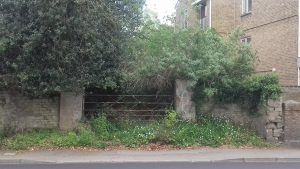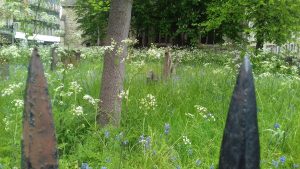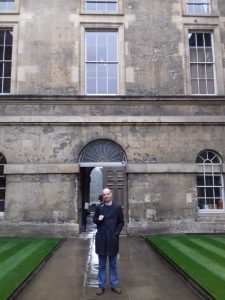Dr Robert M. Francis reflects on the impact place has upon the self and his first week in Oxford as a full – time David Bradshaw Creative Writer in Residence, 2019.
With my first week as David Bradshaw Creative Writer in Residence complete, I want to start my first blog by sending out some thanks: to the Complete Works of Evelyn Waugh team for putting their trust in me and giving me this incredible opportunity; the teams at the Weston Library and Worcester College for being so welcoming – special thanks to Alexandra Franklin from the library and to Worcester College’s Academic Detective, Elizabeth Smith – both of these ladies are true treasures.
I’ve spent much of this week strolling around Oxford’s stunning streets and wisteria dappled quads – taking pictures and making notes as I go. As a writer, one of my preoccupations is how our places impact upon our sense of self; what Environmental Psychologist, Harold Proshansky termed Place-Identity. We connect with our locale through communal memory, connections with heritage, culture, landscape – things as simple as a place’s functionality and as deep as its Anglo Saxon history. All of these things are absorbed by the inhabitants of a place and become an important part of how we see ourselves in the world. This place-identity is an important marker of what makes our homes our homes and what makes up our selfhood; as important as our ethnicities, religions, class, genders and sexualities.
Oxford’s communal identity has a lot to do with its scholastic and religious heritage – it stands as a beacon for excellence across the world and a place that champions its traditions as a route to excellence. This manifests itself in the architecture and gardens, it’s in the preserved mix of different ways of approaching study and prayer that spans centuries. Take a walk around the ordered shelves of the Bodleian or the Baroque curves of Radcliffe Observatory and you’re struck, awestruck perhaps, by the extent to which these places were designed as monuments of knowledge, truth-seeking, inspiration. There’s weight here, deep and rich.

Rusted gates between old stone pillars lead to nowhere zones and gypsy scholars. @RMFrancis will be undertaking psychogeography walks around Oxford, throughout the residency
My writing time this week has been spent at Worcester College. Each morning, as I walk through the arches and into the quad I feel a sense of reverence. This reverence is both a judge and a call to arms. There’s energy here, formed over centuries and fuelled by orderliness, tradition and the exceptional people that toil and study here. It whispers to me – Be better, Rob. Be as good as you can be. Yet, it also asks – Are you good enough? Worcester College, its cousins and the wider city has this double-edge at the heart of its place-identity. It’s this I’ll be playing with as I write over the coming weeks.
This is something Evelyn Waugh thought and wrote about too. Brideshead Revisited is, in part, about its characters attempting to push back against the potential upheavals of progress. Waugh took a hard line on this, even considering his own Hertford College as too new and too vulgar for the necessary maintenance of its religious and scholastic customs. Perhaps this is why much of Waugh’s work, from Brideshead to Decline and Fall and The Ordeal of Gilbert Pinfold, thematically fuse the conservative, Christian and orderly, with the wild, boorish and tumultuous. Like so much of my favourite art, Apollo and Dionysus are going toe to toe with their blows.

Wildflowers colonise the graves at Mary Mags in Oxford. @RMFrancis enjoying uncovering the overlooked in his first psychogeographic drift
As I move through this city, its environs and edgelands, I’ll be keeping this in mind and using these ideas as a point of departure for my own creative response to Oxford.
Read more about Rob’s residency and upcoming residency activities


 Subscribe to 's posts
Subscribe to 's posts
Comments are closed, but trackbacks and pingbacks are open.